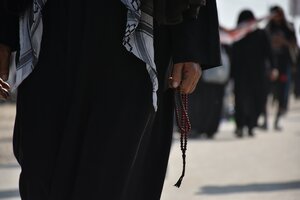Cultural production
Cultural production: the role of rituals, visual art and new media

The role of cultural production in perpetuating hegemonic narratives or in creating subversive counter-narratives is well attested. AlterUmma’s third and final area of investigation looks at how Shii clerical authorities and their networks have developed new modes of cultural production in the religio-political mobilisation of their followers and the creation of modern Shii communal identities.
In order to respond to the state autocracy and exclusion faced by Shii communities in the Middle East, clerical authorities drew on the collective historical memory of persecution, marginalisation and oppression resulting from the Shii minority experience and their ritualistic and artistic articulation in Shii practices. This collective memory is also referred to in the current sectarianisation of Middle Eastern geopolitics.
The experience of state oppression and state-sponsored anti-Shii sectarianism has found its strongest articulation in Shii ritual practices, poetry and visual art. Shii ritual activities are aesthetically enhanced by their poetic and visual dimensions. Poetic eulogies are recited during the performance of rituals remembering mythico-historical events in the formative period of Shii Islam. Theatrical performances of key events and other rituals involve in elaborate mise-en-scène with visual and audial elements, creating a distinct modern Shii aesthetics. The project will employ an embodied and sensorial notion of aesthetics when investigating these rituals.
AlterUmma also investigates how rituals not only express existing religious ties but also produce connections, socialities, and a sense of belonging through their aesthetic forms, in particular in diverse transnational and diasporic spaces such as Kuwait, Damascus and London. It will also explore how innovations and modifications to Shii ritual practices first occurred in diasporic contexts before they were transferred back to the centre. Shii rituals have also been affected by discourses of reform and modernisation criticising more unruly and ecstatic elements of their performance. This includes the demise of public spectacles of male virility and contestations around the public performance of ritual practices. These innovations also question gender dynamics, with women in diasporic contexts performing rituals that have been traditionally viewed as male privileges.
In addition to ritual practice, clerical authorities and their transnational networks have used new forms of media as part of the communal and socio-political mobilisation of Shii communities. These range from satellite channels and tape recordings of sermons and speeches to the use of social media.
The use of new media for ideological critique and as powerful political weapons to transform popular consciousness is well-known. AlterUmma will research the use of modern media, such as global satellite channels based in the Middle East and Europe, to articulate Shii communal identities in the public arena, in particular in diverse transnational and diasporic spaces such as Kuwait, Beirut, London and Berlin.
Dr Fouad Gehad Marei, Dr Nada Al-Hudaid and Dr Stefan Williamson undertake research on this part of the AlterUmma project. Dr Marei investigates forms and iterations of Shii ritual cultures, religious activism and political socialisation/ mobilisation in the Middle East and diasporic communities. The materiality of dreams and miracles in contemporary Shii art in the Arabic-speaking Gulf region is the focus of Dr Al-Hudaid's research. Dr Williamson Fa examines patterns of ritual change and trans-local flow across Turkish-speaking Twelver Shii communities in the post-Soviet Caucasus region.
